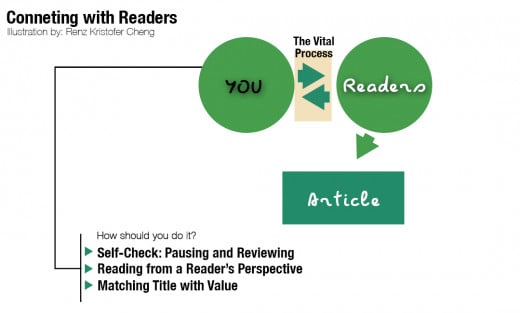How to be a Successful Online Writer | Tips and More!

Thinking of something to write about takes a lot of effort and time already,but it doesn't just stop once you figure it out. It will spill out to the next step, wherein you need to put into words your fresh ideas. And I believe this is as tough as the preceding process.
Note: This is the second part of my DIY Writing Guide Series, you may want to first check out Part 1 - Choosing the Right Topic, if not just proceed with the rest of this article.
Following the principle of Value is King, you need to ensure that you are truly generating value in the process. Hence, I have some tips I can provide to you.

How many articles or posts have you written/published so far?
Self-Check: Pause and Review
I know how exciting it is to share what you have in mind. However, you need to make sure that you are not just babbling but still providing some useful information for your readers. Second, as you continue to write, you may tend to unintentionally just repeat and duplicate existing information. This is one of the reasons why you need to have a self check - you don't just want to replicate those that are already in the web because chances are they will outrank you.
To facilitate this procedure, you may want to read again other articles closest to your topic. Then, you can benchmark your draft to determine whether you are generating additional useful content.

Read from the Perspective of a Reader
In relation to the things I mentioned above, you need to read your draft from the perspective of a reader. Hence, you may need to ask yourself (as a reader) the following questions to help you pinpoint areas of improvement:
- "Is the article easy and smooth to read?"
- "Will I find the information that I need"
- "Are there a lot of things that I don't need but are there?"
- "Is the author (which is you) being too obvious, shallow or inconsiderate?"
- "Will I really read this from start to finish?"
However, if you feel that you will just be biased upon yourself, you may ask a friend, as an alternative, to read the draft, and verify if he/she finds it easy (yet very informative) to read. If not, then you may really need to tweak your post for some adjustments (be it additions, omissions or both). Don't be hassled by this. All the effort that will pour on your writing will eventually pay off!


Writing Effective Title for your Article
- Use simple words rather than archaic and/or complicated ones
- Start with the words "How to" if applicable (a lot of searches involve finding ways how to <insert any verb here>)
- Don't make it too short but not too long as well. 50 to 65 characters may do the trick. As long as the title reflects the value well, you won't have anything to worry about
- Try to type words related to your topic in Google search - the auto-suggestions may give you a clue of the words most often used to conduct a search
Align the Title with the Content
Organic traffic comes from two major sources - social media shares and search traffic.
In order to have a higher probabilty of getting read across wider audience, you may need to choose an appropriate title that will represent the value you generated.
Take this as an example. Suppose you just created a fantastic recipe for colds - an amazing herbal chicken soup. Do you think people will stumble upon it or read the article when the title is "I have a Cold - Yummy Chicken Soup". Well, I assume not much. However, you may get lucky by being shared across social media channels (after all, the title may stimulate curiosity among potential readers). But still, don't you want to optimize and capture the opportunity of getting more readers for your articles via the search engine?
If your answer is yes, then you need to work on your title, and use words that are commonly searched by users. Don't try to add deep jargon - yes it may be creative, but it won't help getting you found across the search engines.
To summarize this third point, aligning the title with the value generated will provide more emphasis and attention to your article!
3-Part DIY Writing Guide Series
For easier navigation here are the 3 parts of the series:
- Choosing the Right Topic
- Writing Value-Generating Content
- Optimizing Published Articles
You're done!
Wrapping Up: Keep the Value Afire
Identifying the value you want to generate is just the first step. What's possibly more important is sustaining that value and materializing it into your articles (even novels or books). This can be accomplished by establishing a connection with your prospective readers! Put yourself into their shoes, and it can help out in ensuring high-quality content!
Check out more of this 3-Part DIY Writing Guide series by referring to the text box on the right! Good luck with your writing venture, and I sure hope that it will become a major success!
© 2013 Renz Kristofer Cheng








